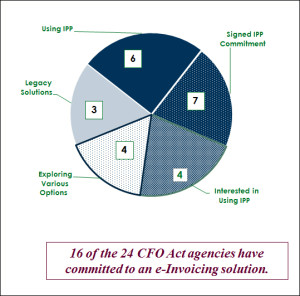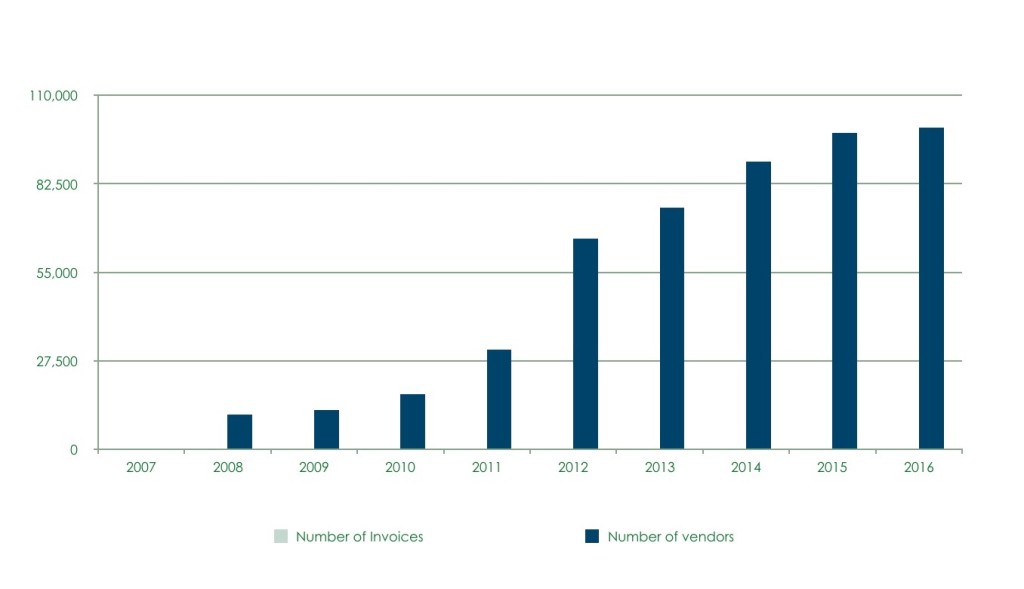

John Hill, the Bureau of Fiscal Service’s assistant commissioner for payments and chief disbursing officer, said agencies are getting ahead of the OMB deadlin...
In the short nine months since the Office of Management and Budget mandated agencies to move to an electronic invoicing system by 2018, agencies are flocking to the Treasury Department.
A majority of the cabinet-level agencies plan on moving or have moved to the Bureau of Fiscal Service’s Invoice Processing Platform (IPP).
John Hill, the Bureau of Fiscal Service’s assistant commissioner for payments and chief disbursing officer, said 13 of 24 CFO Act agencies recently have signed a memorandum of agreement with the Fiscal Service to implement IPP, increasing the total to 16 departments using the shared service.
“Implementing IPP is like implementing any IT system. There are computer changes, testing and a shake-down process that has to occur,” Hill said in an exclusive interview with Federal News Radio. “So all they really signed is a commitment that they will use IPP because it allows us to schedule with them for when we will work with them and their IT suppliers to make the changes to their system to implement IPP. It’s not an instantaneous thing, but in a lot of ways it’s a serious agreement.”
The decision by these 13 agencies comes as OMB issued a memo in July requiring agencies to move to a standard platform to electronically process vendor invoices.
While OMB didn’t specifically call out IPP as the one standard system, agencies including the Environmental Protection Agency, the departments of State and Health and Human Services and the U.S. Agency for International Development are joining the more than 80 other small agencies in using Treasury’s shared service, which has been an option since 2008. State, EPA, USAID and HHS will join several other large agencies that have been using IPP for several years, including the Agriculture Department, the Small Business Administration, the Social Security Administration and the Government Publishing Office.
“Most of the agencies that signed agreements recently have scheduled implementation dates later in 2016 or early in 2017, and some later in 2017,” Hill said. “It all depends on the core accounting system you use and the core procurement system you use. Many of these agencies use a commercial software package offered by SAP, Oracle or CGI Momentum. For one of the vendors there are built in interfaces so when the agency uses the package, IPP is offered automatically and no changes are required. But, of course, they have to use that version of the software so for some of these departments they have to upgrade their version of the software that has the built in interface. For those packages that do not have an interface, they will have to build one, which involves some programming to do that. But the good news is so many agencies are using IPP today, in many cases, the interfaces are built, perhaps in use at another agency, and with agreements, cooperation and collaboration a lot of that work done at one agency can be transferred to another. So it’s not like starting from scratch.”

Hill said several others are evaluating IPP, and he expects several of them to use the service in the coming years.
The Defense and the Veterans Affairs departments have their own e-invoicing platforms that are potential options for other agencies to use.
At the same time, the Fiscal Service also reached another milestone in late March, surpassing 100,000 government contractors getting paid through platform. This is up from 80,000 at the end of 2015.
“This is really where the transformation is most visible,” Hill said. “If you think about vendors in the current configuration and in the old days, a vendor that did business with two agencies was really submitting invoices to two different locations, and when he or she needed to find status of payment or status of invoice, they’d have to call around to different agencies and different places. Now all of a sudden with many agencies using a common system, that vendor can submit invoices to one place, IPP.gov, and the invoice gets routed appropriately to the agencies. When the vendor has questions about the status of the invoice or payment, he can go to that site and find exactly the status of that payment or that invoice regardless of whether it’s for agency A or agency B.”
Hill said vendors also must sign an agreement with the Fiscal Service. Then the contractor will receive a password and can begin submitting invoices.
Hill said he estimates that about two-thirds of all vendors now are using IPP. He said that’s based on the fact that when the Fiscal Service brings on a new agency, it finds at least 60 percent of that agency’s contractors already are enrolled in IPP.
The Fiscal Service has been preparing to take on tens of thousands of new vendors and dozens of agencies for some time.
“We were planning for a world where we would handle perhaps tens of millions of invoices so the capacity is built into the system to handle it. It’s also built into a call center which has sort of an expandable workforce that we can add to or subtract from as the call volumes change,” Hill said. “We have been modifying the system continually since 2008. We have a very active user group composed of members from all the agencies that use IPP. We meet a couple of times a year and they suggest changes to IPP and we take those inputs and come up with a work plan for the coming year. Lately, we’ve been able to accommodate most of those changes when there is a majority of support for them.”

The Fiscal Service also works with agencies on IPP implementation and workforce training to ensure a smooth transition.
“What we’ve seen an uptick in lately is agencies who want to learn more about IPP and one thing we’ve done is host a monthly session here in the Treasury building where agencies can come by and we go into detail probably a 1 1/2 hour to two hour presentation on IPP with our experts. Agencies bring their experts and ask a lot of questions. We’ve seen those sessions grow in popularity from one or two attendees to lately probably on the order of 15 to 25 attendees,” Hill said. “Also we’ve gotten a lot of email traffic and questions that come in. We also are visiting agencies onsite, and there has been one agency in particular that we’ve visited probably three or four times and each time having six-hour sessions going into detail. For a lot of agencies, this is an important decision because invoicing really is a relationship between a private supplier and a federal government procurement. It’s much more than a financial transaction.”
Hill said the benefits of IPP for agencies and vendors alike are clear. He said agencies are reducing the cost and time to process invoices. That means agencies are avoiding late payment penalties. Contractors are getting paid faster and spending less time tracking down late or missing invoices.
“This is a product that has been battled tested in a whole lot of agency environments and represents over the years the combined wisdom and combined experience of hundreds of procurement, acquisition and financial folks across a variety of agencies,” he said. “Very unlike an off-the-shelf package that might have been designed for commercial acquisitions, this is very much tailored the unique world of acquisition in the federal space. That would be the differentiating factor between IPP and other suppliers.”
Copyright © 2024 Federal News Network. All rights reserved. This website is not intended for users located within the European Economic Area.
Jason Miller is executive editor of Federal News Network and directs news coverage on the people, policy and programs of the federal government.
Follow @jmillerWFED


